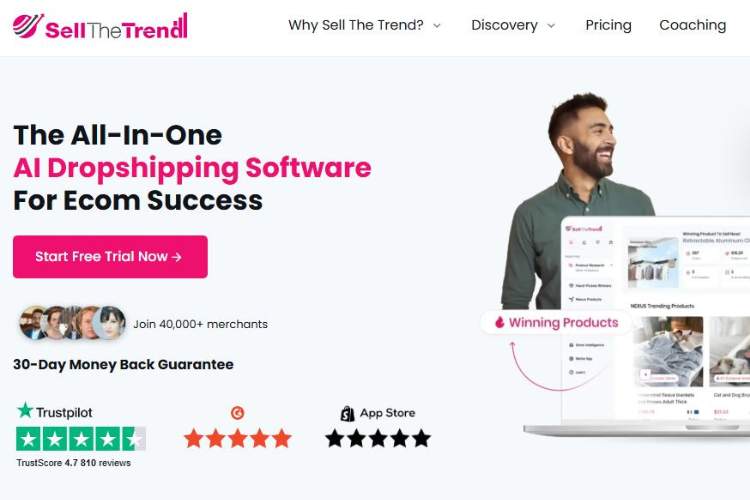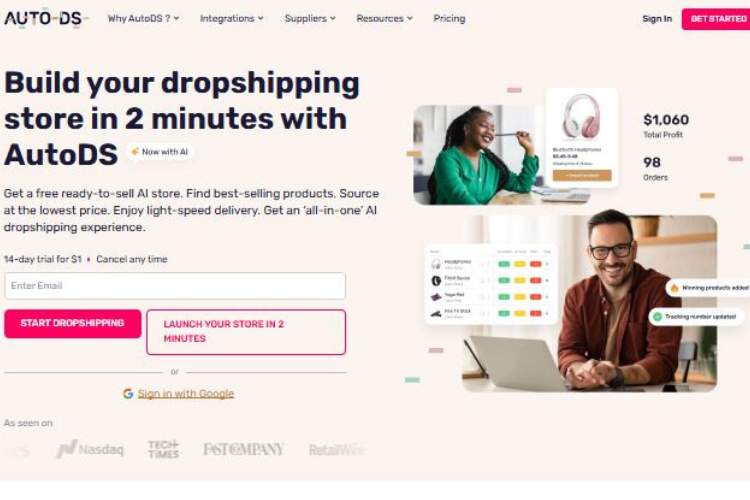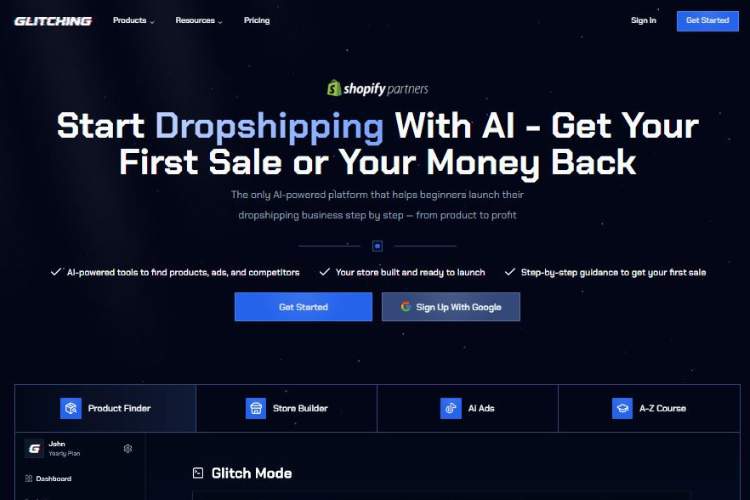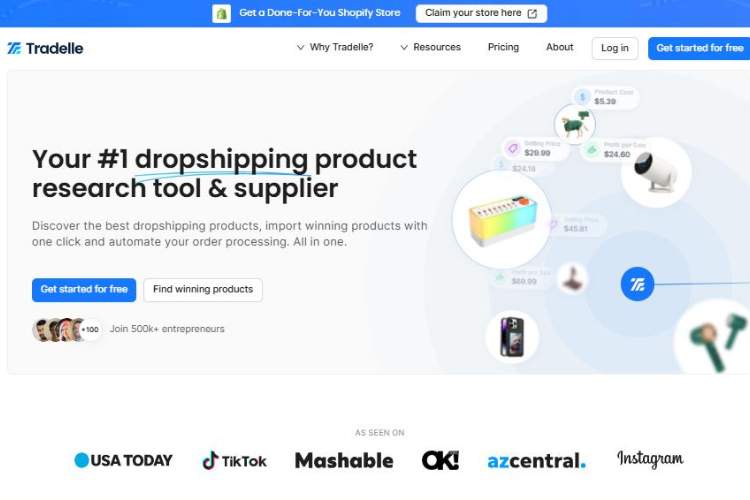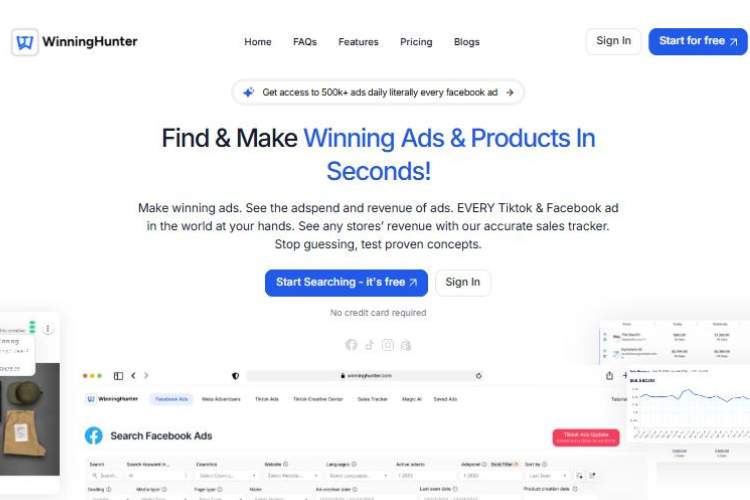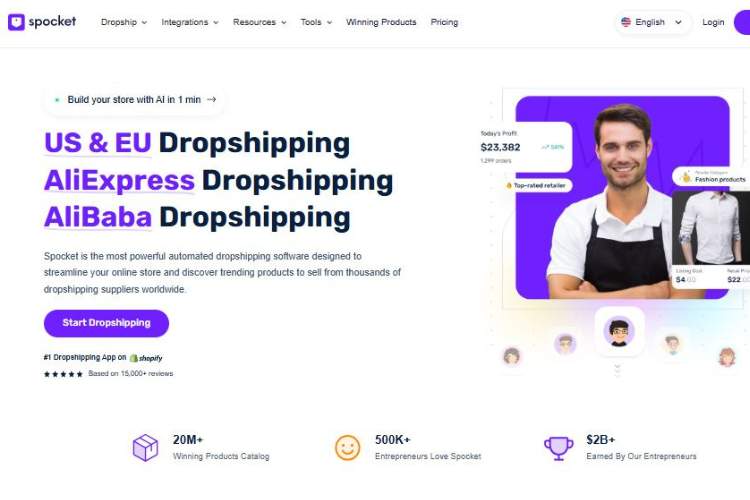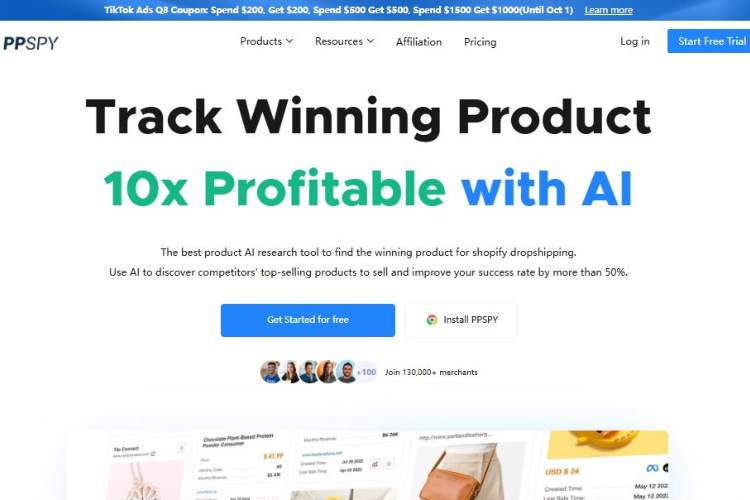Building a dropshipping store used to mean endless hours wrestling with themes, writing product pages, setting up shipping rules. Now, AI can help you build a store almost hands-free. Here’s what I’ve learned after testing several AI-based dropship store builders: how they work, who they’re for, and whether they’re worth the hype.
Why AI-Powered Store Builders Matter
Ever tried setting up a Shopify store and got stuck on product descriptions or layout? With AI-powered builders, you can have the skeleton of a store—product pages, descriptions, images, even home page—all generated in minutes.
The result: less grunt work, fewer creative blocks, more time testing ads. It’s not magic, just smart shortcuts that work—if you pick the right tool. And, when you’re automating the visual, narrative, and listing process, you’re scaling faster. Your store goes from blank canvas to working storefront faster than ever before.
What Makes a “Dropship Store Builder” Worth Trying
A good AI dropship store builder should offer:
- Automated product page generation (titles, benefits, SEO)
- Landing page or homepage templates designed for conversion
- Image editing or product image creators optimized for ads
- Sync or push to Shopify/WooCommerce with one click
- Light customization—so your store feels unique
- Ad script suggestions or ad creative prompts
Tools that combine store setup and product discovery are especially powerful—because once you find a winning product, you can import it and build the store page in one session.
How I Tested These Tools
I tested each tool by choosing a product, using its AI to generate a product page, customizing the layout, checking image quality, syncing to Shopify, and evaluating the ease of setup. I also noted pricing, support, and how well the AI handled edge cases—products with unusual descriptions or unfamiliar niches.
In-Depth Reviews of AI Store Builders
Sell The Trend
What it is:
Sell The Trend is primarily a product discovery and marketing platform, but with features that automate store page generation. Once you find a winning item via its NEXUS AI engine, you can auto-import it into your store with optimized descriptions, title tags, multiple images, and even pre-built ad copy suggestions. It provides built-in landing page layouts, sections for cross‑sells, and product upsells.
For shoppers who want both research and store building in one place, this is gold. The AI takes care of SEO optimizations like meta tags, and the page builder gives you flexibility to add banners or FAQ blocks via a drag-and-drop interface. You still get control—you can edit sections—but the heavy lifting is done. It’s ideal for someone building branded stores at scale.
Core features & use cases:
- AI-assisted store page builder tied to product discovery
- Import templates with pre-written copy
- Ad creation assistance, TikTok/Facebook ad spies
- Niche category page templates
Who it’s for?
Dropshippers scaling multiple branded stores, marketers wanting both research and store-building efficiency.
AutoDS (Finder + Store Tools)
What it is:
AutoDS is known as a dropshipping automation suite. Its Finder module helps you pick trending products across AliExpress, Amazon, Walmart, and more. Once you find a product, AutoDS generates a listing—title, bullet points, pricing, variants—and you can push it into Shopify or eBay. The tool even includes pre-filled product templates and CSV export options. Yes, the focus is more on logistics and fulfillment, but the store builder part is solid.
It’s reliable, especially when you’re handling hundreds of listings. With scheduled imports, price syncing, automation of order fulfillment, and profit calculators, you’re not just building a store, you’re automating its entire management.
Core features & use cases:
- Product listing templates and bulk import
- Shopify/eBay/WooCommerce integration
- Automated stock and pricing adjustments
- Scheduled uploads and profit margin features
Who it’s for?
Medium to high-volume sellers needing minimal manual effort and reliable store setup pipeline.
Glitching AI
What it is:
Glitching AI is an AI-powered dropship store builder that combines product sourcing, page generation, and marketing support in a unified dashboard. Its heart lies in automating the product-pick-to-live-store pipeline: you pick a product, and it builds a fully formatted product page—complete with title, feature bullets, story-driven description, and embedded image banners.
Then it offers landing page templates, hero sections, upsell blocks, and even ad script templates. The AI adapts tone based on your niche—whether wellness, gadgets, or fashion—and offers multiple style variations. This means you don’t have to wrestle with theme coding or copywriting; the AI does it fast.
The tool also has a simple product image editor that lets you remove backgrounds or generate ad mockups quickly. Once the page is finalized, you can sync to Shopify or WooCommerce with a click. It’s especially helpful for solo dropshippers who hate manual design or store setup. It’s not perfect—you will still want to tweak the copy for your brand voice—but it cuts setup time from hours to minutes and feels like working with an assistant who gets tired less.
Core features & use cases:
- AI-generated product pages and landing templates
- Ad-copy script generation
- Visual templates and image editing for ads
- One-click import to Shopify/WooCommerce
Who it’s for?
Solopreneurs, newcomers who want to launch quickly, marketers testing niches fast.
Tradelle
What it is:
Tradelle is a supplier‑centric dropshipping platform that includes a store-building assistant. Its AI identifies trending products and suggests pages with copy blocks, supplier ratings, and shipping lead time estimates.
The store builder automatically pulls product specs, images, and promotional copy into your e-commerce theme. While less polished than others, it supports compliant supplier data inclusion—great if you want transparency in fulfillment and shipping. The product pages can be customized after import. It’s handy for someone assessing both supplier reliability and store layout in one go.
Core features & use cases:
- Supplier data–infused product page builder
- Profit and shipping calculators
- One-click import and light customization
Who it’s for?
Dropshippers prioritizing vetted suppliers, shipping transparency, and full data compliance.
Winninghunter
What it is:
Winninghunter scrapes social ads, TikTok viral content, and marketplace bestsellers to spot early winning products. Its store builder module then generates product pages with ad-tested copy, caption suggestions, and recommended creative angles. The tone is casual but grounded in ad psychology—so your product pages mirror the ads that are trending. It’s a sharp tool for those who rely heavily on influencer-style marketing and want the store to reflect that direct ad angle.
Core features & use cases:
- Ad trend scraping and copy modeling
- Product page drafts with ad-like tone
- Creative brief suggestions for page visuals
Who it’s for?
Marketers building store pages that match ad campaigns or influencer-led promotions.
Spocket
What it is:
Spocket is a curated supplier platform emphasizing fast-shipping products from US/EU/Canada. While not a “store builder” per se, its integration with Shopify/WooCommerce enables quick import of product listings with complete details—descriptions, images, stock levels, shipping times—and automatically structures product pages.
Spocket’s import process includes professional copy and image formats tailored for conversion. It also allows sample ordering to validate quality before listing. Though more about supplier quality than AI page design, it’s still a useful builder alloy: importing products with ready-made product pages optimized for speed and reliability.
Core features & use cases:
- Curated high-quality product listings with structured pages
- Fast shipping info embedded, sample orders
- Seamless import to Shopify/WooCommerce with preformatted pages
- Inventory and price sync
Who it’s for?
Dropshippers catering to Western markets and focusing on fast delivery, trust, and reliability.
PPSY
What it is:
PPSY is a utility-first dropship assistant that includes product validation, supplier vetting, and a page builder. Once a winning product is identified, PPSY auto-generates a product page with title, key benefits, and bullet features. It includes profit calculators, trust badge suggestions, and shipping estimates in the copy—helping conversion. While the visual builder is simple, the focus is on conversion copy uniformity and accuracy.
Core features & use cases:
- Product validation and supplier insight
- Copy-focused product page generation
- Calculator embedding and trust elements
Who it’s for?
Dropshippers focusing on copy optimization, numbers, and conversion-first pages.
Conclusion & Recommendation
After testing and digging into each, the tools that came out strongest were:
- Sell The Trend – best full-stack builder: product discovery, AI-generated pages, ad tools, store automation.
- Glitching AI – ideal for quick product-to-store workflows with built-in page and marketing AI.
- AutoDS – excellent for high-volume automations and reliable store setup for logistics-heavy sellers.
If you’re starting out and want speed without overwhelm, Glitching AI or Sell The Trend are your best bets. If you’re scaling numerous stores and want automation that doesn’t break, AutoDS serves well.
Choosing between them depends on whether you want marketing page automation or backend scale first. Personally, I’d begin with Sell The Trend—learn the product-to-store pipeline fast—then layer on AutoDS when you’re ready to scale volume. Or start with Glitching AI if you don’t want to learn too many tools at once.
Those three tools cover page generation, store sync, ad-ready copy, and scale automation. The rest are niche picks that can be supplementary depending on your needs. The future of dropshipping store building? AI is making it fast, smarter, and frankly more fun—or at least less headache‑y.


